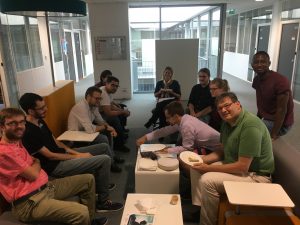Links is a research team of Inria Lille, the University of Lille, and the CNRS (Cristal Lab).
| Links' News |   |
Fri, July 16, 2021 9:00 am 10:00 am | ICALP 2021 Best Paper award for Charles Paperman et al. |
Thu, April 22, 2021 all day | "Dynamic membership for regular languages" @ICALP21 |
Fri, April 2, 2021 all day | |
Mon, December 14, 2020 2:00 pm 4:00 pm | Soutenance de thèse - Jose-Martin Lozano |
Wed, December 2, 2020 all day | AAAI 2021 paper accepted by Florent Capelli et. al. Certifying Top-Down Decision-DNNF Compilers |
Wed, December 2, 2020 all day | AAAI 2021 paper by Mikaël Monet et al. accepted The Tractability of SHAP-Score-Based Explanations over Deterministic and Decomposable Boolean Circuits. arXiv: arxiv.org/abs/2007.14045 |
Fri, November 13, 2020 all day | PODS 2021 paper accepted Corentin Barloy, Filip Murlak and Charles Paperman Stackless Processing of Streamed Trees paperman.name/data/pub.....d.pdf |
Thu, October 1, 2020 all day | Corentin Barloy starts his PhD project |
Thu, October 1, 2020 all day | Mikael Monet arrives as Junior Researcher |
Tue, September 29, 2020 9:00 am 10:00 am | ANR Project of Florent Capelli accepted. On knowledge compilation |
Tue, September 1, 2020 all day | Arrival of Chérif Ba as engineer |
Mon, August 24, 2020 9:00 am 10:00 am | MFCS paper accepted by Paul Gallot, Aurélin Lemay and Sylvain Salvati: https://hal.inria.fr/hal-02902853 |
Fri, July 24, 2020 2:30 pm 4:30 pm | Dr. Momar Sakho defended his PhD. |
Mon, July 6, 2020 to Fri, July 10, 2020 all day | École d'été Kocoon (cancelled) organisée par Florent Capelli, Pierre Marquis, Stefan Mengel, and Pierre Bourhis, à Lille More info at: kocoon.gforge.inria.fr/ |
Tue, June 30, 2020 all day | ICALP 2020 paper by Charles Paperman accepted On Polynomial Recursive Sequences ( Michaël Cadilhac, Filip Mazowiecki, Charles Paperman, Michał Pilipczuk and Géraud Sénizergues ) drops.dagstuhl.de/opus.....7.pdf |
Mon, December 16, 2019 to Thu, December 19, 2019 all day | Workshop Kocoon at Arras, organized by Pierre Bourhis, Florent Capelli, Pierre Marquis and Stefan Mengel More info at : kocoon.gforge.inria.fr/ |
Fri, September 27, 2019 all day | Mikael Monet visiting |
Tue, June 4, 2019 all day | Arrivée de Fanny Canivet en stage de L3 : "Proof systems based on restricted Boolean circuits" |
Fri, May 10, 2019 10:00 am 11:00 am | IJCAI'2019 paper by Sophie Tison et al. accepted. In cooperation with Montpellier: Oblivious and Semi-Oblivious Boundedness for Existential Rules” (P. Bourhis, F. Ulliana, M. Leclère, ML Mugnier, S. Tison, L. Gallois). |
Mon, April 22, 2019 all day | SAT'19 paper by Florent Capelli accepted Knowledge compilation languages as proof systems ,arxiv.org/abs/1903.04039 [ arxiv.org/abs/1903.04039 ] |
Fri, April 12, 2019 to Thu, April 18, 2019 all day | Rustam Azimov from Saint Petersburg visits Links |
Mon, April 1, 2019 to Fri, April 26, 2019 all day | Semyon Grigorev from Saint Petersburg visits Links Semyon is the supervisor of Rustam Azimov. He will work with Sylvain and Joachim Inria Lille |
Fri, January 18, 2019 all day | Visit of Marie-Laure Mugnier and Federico Ulliana from Montpellier Inria 40 Avenue Halley, 59650 Villeneuve-d'Ascq, France |
Thu, December 20, 2018 5:00 pm 6:00 pm | STACS'19 paper by Florent Capelli accepted: "Tractable QBF via Knowledge Compilation" with Stefan Mengel |
Fri, November 16, 2018 11:00 am 12:30 pm | Aurelien Lemay's Habilitation defense IRCICA |
Team presentation
The appearance of linked data on the web calls for novel database management technologies for linked data collections. The classical challenges from database research need to be now raised for linked data: how to define exact logical queries, how to manage dynamic updates, and how to automatize the search for appropriate queries. In contrast to mainstream linked open data, the LINKS project will focus on linked data collections in various formats, under the assumption that the data is correct in most dimensions. The challenges remain difficult due to incomplete data, uninformative or heterogeneous schemas, and the remaining data errors and ambiguities. We will develop algorithms for evaluating and optimizing logical queries on linked data collections, incremental algorithms that can monitor streams of linked data and manage dynamical updates of linked data collections, and symbolic learning algorithms that can infer appropriate queries for linked data collections from examples.
Research themes
We will develop algorithms for answering logical querying on heterogeneous linked data collections in hybrid formats, distributed programming languages for managing dynamic linked data collections and workflows based on queries and mappings, and symbolic machine learning algorithms that can link datasets by inferring appropriate queries and mappings. Our main objectives are structured as follows:
- Querying heterogeneous linked data. We will develop new kinds of schema mappings for semi- structured datasets in hybrid formats including graph databases, rdf collections, and relational databases. These induce recursive queries on linked data collections for which we will investigate evaluation algo- rithms, static analysis problems, and concrete applications.
- Managing dynamic linked data. In order to manage dynamic linked data collections and workflows, we will develop distributed data-centric programming languages with streams and parallelism, based on novel algorithms for incremental query answering, will study the propagation of updates of dynamic data through schema mappings, and will investigate static analysis methods for linked data workflows.
- Linking graphs. Finally, we will develop symbolic machine learning algorithms, for inferring queries and mappings between linked data collections in various graphs formats from annotated examples.
International and industrial relations
- Stream Processing: QuiXTools (with Innovimax)
- FUI Hermes



